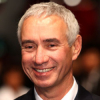Roland Emmerich

Roland Emmerich
Roland Emmerichis a German film director, screenwriter, and producer, widely known for his disaster films. His films, most of which are English-language Hollywood productions, have made more than $3 billion worldwide, including just over $1 billion in the United States, making him the country's 14th-highest grossing director of all time. He began his work in the film industry by directing the film The Noah's Ark Principleas part of his university thesis and also co-founded Centropolis Entertainment in 1985 with his...
NationalityGerman
ProfessionDirector
Date of Birth10 November 1955
CityStuttgart, Germany
CountryGermany
With Jedi, I was amazed that you could make a half a movie out of a finale.
It doesn't really matter if this movie's a success or not, because it's already out there.
I thought it must be pure science fiction. But when I checked it out I found a lot of magazine articles that actually supported the theory behind the book which was incredible. That's when I decided to acquire the rights of the book and everything went from there.
It is very important to tell this story from the victims' point-of-view. I realized that with independent financing, somebody has to be the locomotive. So I'm putting my own money into it.
The movie is fiction, ... We'd like to keep it that way.
I also, since we have digital cameras, the blue screen composites are so good that I would rather shoot on a stage than there, especially the complicated sequences. The sun never sets in a studio stage.
The President of the United States has super star status. He's not a normal person, because he's protected like no other person in the world and if this man's life is in danger, the whole world is kind of in peril in a way, because the leader of the free world could fall into the hands of terrorists.
We have certain things where we know they exist or "everybody knows they exist," but naturally nobody can photograph them, because they are so super secret. For example, the PEOC, the Presidential Emergency Operations Center exists, but nobody knows how it looks, but it's a so called bunker where he can survive a nuclear attack.
I was actually privately in the White House like invited by Clinton to screen Independence Day, so I know how the private residence looks. I didn't snap a picture, but I have a photographic memory and then I could take a guided tour in the West Wing.
It's very, very rare you find something really original and also because a lot of original stuff, most of the time has no chance, because it's so expensive to make something famous or put it in people's head that it's the one to see, it's like awareness has to be almost like at 80% or 90% if you make an expensive summer movie and that's very hard to do with anything an the White House naturally is in itself some sort of a trademark.
I think every good, entertaining movie should have a message. I really believe that, because if you do it without it, the film feels a little bit soulless.
It's still the White House exploding [in "Independence Day"]. It was just so provocative, and no one had ever done it before. I remember when we shot it, how everyone was excited.
I'm doing a much smaller movie. It's set in Germany and it's a totally different subject matter. I'm trying to break it up.
Actually, when I did "10,000 B.C.," in the middle of production, I wanted to quit my job, because everything went wrong.